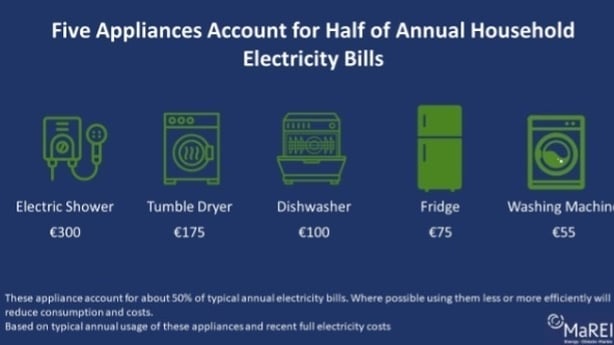How to save cash on your energy bills 16 May 2022

Analysis: reducing energy use is the most immediate measure we can do to reduce our exposure to high energy bills - Dr. Paul Deane, Senior Research Fellow, Energy Policy and Modelling Group, MaREI Centre/ERI
Energy prices are at an all time high, as international oil and gas prices rise in response to the invasion in Ukraine and wider global issues. Ireland is one of the most fossil fuel dependant countries in Europe, spending on average €20 million each day importing fossil fuels from abroad. The consequence of this high reliance is reflected in our high transport, heating, and electricity bills.
International prices, events and conditions determine what we pay for energy in Ireland and the Irish government has little power when it comes to influencing these prices. But as individuals, we have some choices around how much energy we use and when we use it.
While Ireland is not physically connected to Russia via pipeline, we are connected via market prices. We must prepare for sustained high electricity and energy prices throughout the year and beyond, as the world figures out how to live without vast volumes of energy from Russia.
Saving energy and reducing our energy use is the most immediate measure we can do to reduce our exposure to high energy bills. At a local level, a typical family of four will spend between €6,000 and €7,000 per year on energy. Half of this will be on petrol or diesel for the car, with the balance split between home heating and electricity.
But it must be remembered that many people - especially the sick, elderly, and vulnerable - have a much higher exposure and less ability to change energy use and these people need targeted financial protection from the government. However, a high portion of the population can financially benefit from saving energy and the tips below are for families and individuals who are in good health.
Can you save money on your car?
About one third of the petrol and diesel we put into our cars over the year in Ireland is used for short trips of less than 8km. If we can avoid one in five of these trips, we would save between €300 to €500 per year. Trips can be avoided by cycling, walking, carpooling and lift sharing with neighbours (i.e. on the school drop) and trying to double up on trips. The pandemic also allowed many employers and workers to try remote working and maintaining this practice will significantly reduce the amount we spend on fuel for our cars.
If you do have to travel a long distance on a motorway, driving a little slower will save you money. Driving at 100 kph rather than 120 kph on a round trip from Cork to Dublin will save you €10 in fuel costs, while the trip will take an extra 50 minutes.
Heating up
Unfortunately, Ireland has a poor housing stock, with most homes wasting more heat than usefully using it. A house built in the 1990s with oil central heating costs a family about five times more annually to heat than the same sized house built in recent times using a modern electric heat pump. The Government offer generous grants for improving insulation and new heating systems, but these are still financially out of reach for many families.
However, controlling the heat required by adjusting the thermostat can give big savings for families who can do this. Reducing the internal thermostat from 21 degrees to 18 degrees will save between €400 and €500 each year
Families who use oil for central heating should regularly check with local suppliers and try to avail of discounts or lower prices that can occur over summer months when demand for oil is low.
The story with appliances
Just five appliances are responsible for about half of our electricity use so using these less will have a positive impact on reducing your electricity bill. If you use an electric shower, this will likely be the appliance that costs you most so taking a shorter shower will save you money.

While a lot of focus is sometimes on plugging out TVs, phones and tablets etc, the overall financial impact of these actions is relatively small. Modern appliances are mandated to use very little power on standby mode so focusing on appliances that use most electricity will offer the biggest savings.
The government launched a strategy last week with more information on how to reduce energy use. An important social element across communities is to check in on elderly and vulnerable neighbours to see they are prepared for the months ahead. The strategy must be clear from a national perspective: protect those who can’t afford to reduce consumption, and encourage those who can.